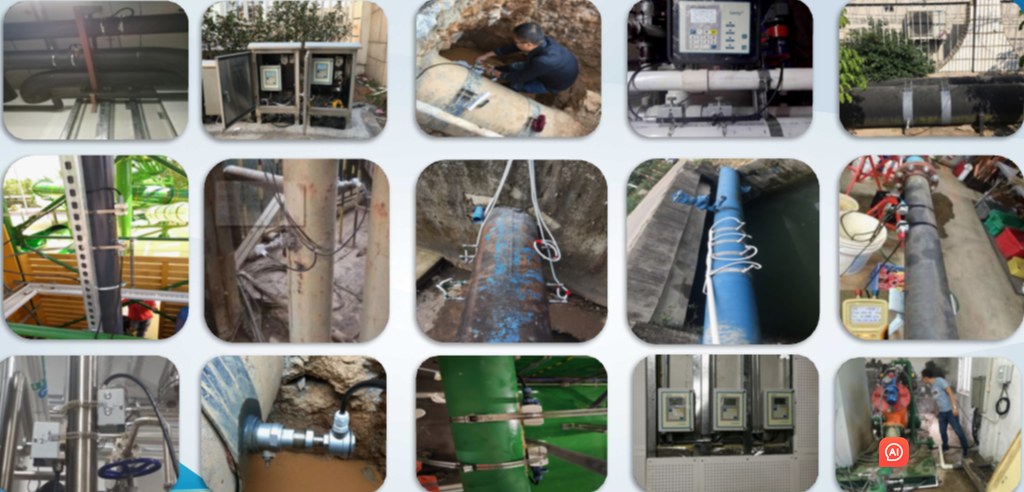
In industrial applications, precise flow measurement is essential for monitoring, control, and optimization of processes. Among various flow measurement technologies, Transit-time ultrasonic flow meters stand out due to their high accuracy and non-invasive nature. These flow meters leverage ultrasonic transit-time principles to calculate flow rates, offering reliable data for fluid and gas systems across a wide range of industries, including oil and gas, water management, and chemical processing.
How Transit-time Ultrasonic Flow Meters Work
Transit-time ultrasonic flow meters measure the time it takes for an ultrasonic signal to travel between two transducers placed on opposite sides of a pipe. The basic principle relies on the time-of-flight of the sound waves. When the fluid is flowing, the ultrasonic signal traveling with the flow will be faster than the signal traveling against the flow. The difference in travel time between the two directions is measured, and this time difference provides accurate information on the flow rate.The key term here is Transit-time measurement technique, where the flow rate is determined by calculating the variation in the transit time of the ultrasonic waves, which is affected by the velocity of the fluid inside the pipe.
Advantages of Transit-time Ultrasonic Flow Meters
1.Non-Invasive Measurement: One of the most significant advantages of ultrasonic flow meters is that they do not require direct contact with the fluid. The sensors are mounted externally on the pipe, making them ideal for applications where it is difficult to introduce mechanical parts into the flow or when minimizing wear and tear is crucial.
2.High Accuracy and Reliability: Ultrasonic flowmeter accuracy is one of the main reasons these devices are preferred for critical applications. The precision of the Transit-time measurement technique ensures that the flow rates are measured with a high degree of consistency, even under challenging conditions.
3.Versatility: Ultrasonic flow meters are suitable for measuring various types of fluids, including liquids, gases, and slurries, in pipes of different sizes and materials. This makes them adaptable to a wide range of industries.
4.Minimal Maintenance: With no moving parts, ultrasonic flow sensors generally require less maintenance than traditional mechanical flow meters. This reduces the operational costs over time and improves long-term reliability.
5.Real-Time Data: These flow meters provide real-time flow data, making it easier to monitor and control processes. The real-time data ensures that any anomalies in flow rate can be quickly detected, preventing potential system failures.
Applications of Transit-time Ultrasonic Flow Meters
1.Oil and Gas Industry: In the oil and gas sector, precise flow measurement is crucial for pipeline monitoring and custody transfer. Transit-time ultrasonic flow meters offer non-intrusive and highly accurate readings, making them ideal for both upstream and downstream applications.
2.Water Treatment and Distribution: Accurate flow measurement in water treatment plants and distribution networks is essential for ensuring efficiency and compliance with environmental standards. Ultrasonic flow meters provide reliable data without the need for cutting into pipes, making them especially useful for retrofitting existing systems.
3.Chemical Processing: In chemical plants, where fluids may be corrosive or involve hazardous materials, using non-invasive flow measurement tools minimizes risk while maintaining accurate flow rate data for process optimization.
Challenges and Considerations
While ultrasonic flow measurement technology offers numerous benefits, it’s important to consider some challenges. The performance of Transit-time ultrasonic flow meters can be affected by factors such as pipe conditions (e.g., roughness, corrosion), flow profile, and the presence of gases in the liquid. Calibration and regular verification are necessary to maintain optimal performance.Additionally, the placement of the sensors can be crucial for achieving accurate measurements, particularly in pipes with fluctuating flow profiles or multi-phase flows. Therefore, proper installation and setup are key to ensuring the reliability of these systems.
In summary, Transit-time ultrasonic flow meters are an excellent choice for industries requiring accurate, reliable, and non-invasive flow measurement. Leveraging the time-of-flight principles and the Transit-time measurement technique, these flow meters provide high precision without the need for mechanical components. Their versatility, minimal maintenance requirements, and ability to provide real-time data make them indispensable tools in modern flow monitoring and control systems. Whether in the oil and gas industry, water management, or chemical processing, the adoption of ultrasonic flow measurement technology is helping industries improve efficiency and reduce operational costs.

Post time: Jan-02-2025

